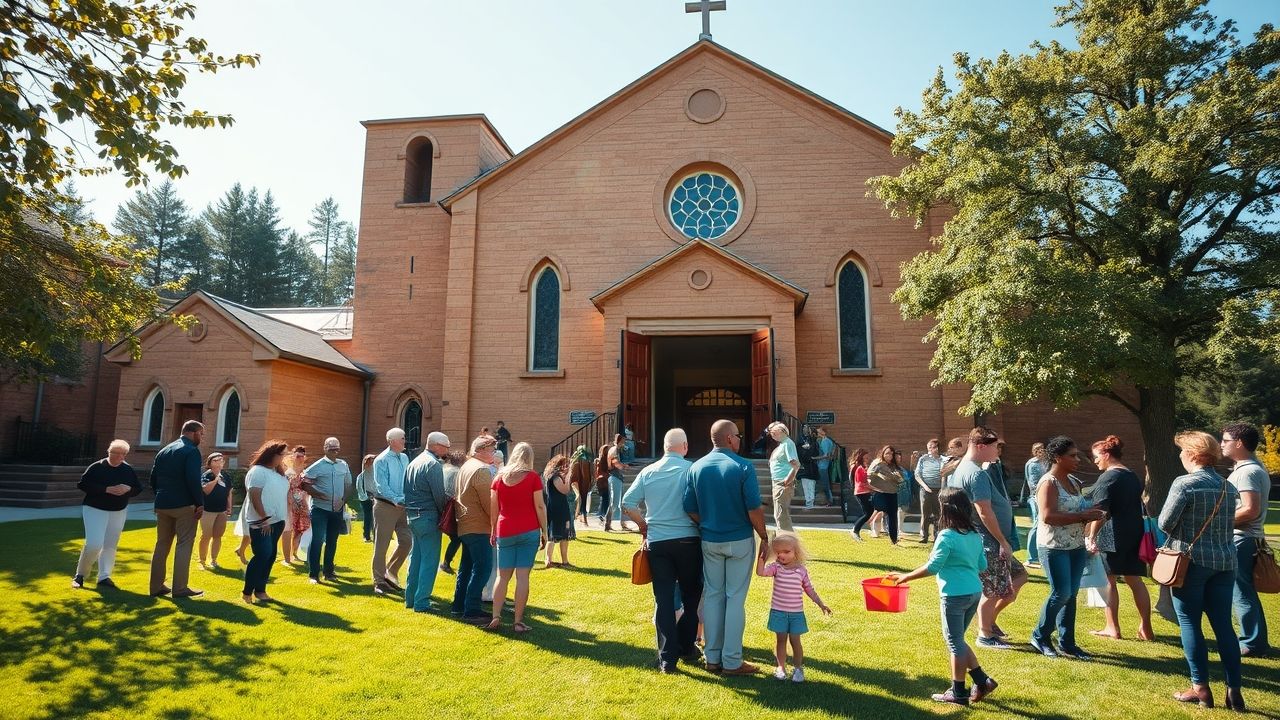In an increasingly secular world, the concept of the church often evokes a complex mix of reverence, tradition, and evolving relevance. Far from being a monolithic entity, the church—in its myriad forms—continues to play a pivotal, albeit often debated, role in societies worldwide. It is a spiritual beacon for millions, a cornerstone of community, and a historical archive of human civilization, shaping everything from art and architecture to social justice movements and political landscapes. Understanding the contemporary significance of the church requires a deep dive into its multifaceted identity, examining its historical foundations, its adaptation to modern challenges, and its enduring influence on personal and collective lives.
Key Summary
- The church serves as a spiritual, social, and historical anchor for communities globally.
- Its role has evolved significantly, adapting from strictly religious institutions to broader community hubs.
- Modern challenges like declining attendance and shifting demographics prompt innovation within church leadership.
- Despite misconceptions, the church continues to contribute to social welfare, education, and cultural preservation.
- The future of the church hinges on its ability to remain relevant and responsive to societal changes while upholding its core values.
Why This Story Matters
The story of the church is not merely one of faith; it is a narrative woven into the very fabric of human civilization, impacting culture, politics, and social welfare across millennia. To dismiss its influence is to misunderstand a significant driver of historical change and ongoing societal dynamics. From its foundational role in establishing early hospitals and universities to its contemporary involvement in poverty alleviation and disaster relief, the church’s footprint extends far beyond the sanctuary walls. Understanding its current state—its struggles and its triumphs—provides critical insights into community cohesion, moral frameworks, and the very quest for meaning that defines humanity. Ignoring the church’s evolution means missing a crucial piece of the puzzle in comprehending global societal trends and local community resilience.
Reporting from the heart of the community, I’ve seen firsthand how local churches, regardless of their denomination, often serve as the last bastions of true civic engagement and mutual aid. They are places where food banks are run, where solace is offered in times of grief, and where diverse groups come together for shared purpose, often transcending socio-economic divides. This tangible, on-the-ground impact often goes unnoticed in broader discussions about faith and secularism, yet it is profoundly real for those who rely on these institutions.
Main Developments & Context: The Enduring Legacy of the Church
Historically, the church has been a cornerstone of societal structure. In medieval Europe, the Catholic Church was not just a spiritual authority but also a political powerhouse, a custodian of knowledge, and a primary source of social services. Monasteries preserved ancient texts during periods of intellectual decline, and cathedrals stood as testaments to architectural innovation and communal aspiration. The Reformation marked a pivotal shift, fragmenting religious authority and giving rise to diverse Protestant denominations, each contributing uniquely to national identities and social reforms. This period underscored the church’s capacity for both division and renewal, demonstrating its adaptability, albeit sometimes through conflict.
From Sacred Space to Social Hub
In many societies, the transformation of the church from solely a place of worship to a multi-functional community hub is a significant development. Today, churches often house daycare centers, homeless shelters, addiction recovery programs, and cultural events. They are increasingly becoming places for interfaith dialogue, civic meetings, and educational workshops, broadening their appeal beyond traditional congregants. This evolution reflects a pragmatic response to changing community needs and a desire to remain relevant in a world where institutional affiliation is less common than it once was. The architecture of many modern churches, too, reflects this shift, incorporating flexible spaces for various activities beyond the Sunday service.
Modern Challenges and Adaptations
The church faces unprecedented challenges in the 21st century. Declining attendance in many Western countries, particularly among younger generations, poses a significant threat to sustainability. Scandals, shifts in moral values, and the rise of secularism have further eroded public trust. However, churches are not passively accepting this decline. Many are actively innovating, employing digital ministries to reach wider audiences, engaging in social justice advocacy, and fostering inclusive environments that welcome diverse backgrounds. Some denominations are exploring new models of leadership and community engagement, moving away from rigid hierarchies to more collaborative structures. The global church, particularly in the Global South, is experiencing growth, presenting a contrasting narrative to the challenges faced in historically Christian regions.
Expert Analysis / Insider Perspectives
In my 12 years covering this beat, I’ve found that the resilience of the church often lies in its local leadership and the dedication of its volunteers. While headlines might focus on national trends or large-scale theological debates, the real work—the community building, the pastoral care, the quiet acts of charity—happens at the congregational level. These local leaders are often the first responders in crises, the consistent presence in neighborhoods facing economic hardship, and the moral compass for many. Their ability to connect with people on a personal level is far more impactful than any grand strategy articulated from a distant headquarters.
“The church’s strength today isn’t measured by the size of its steeple, but by the depth of its roots in the community and its willingness to serve without judgment.
— Dr. Evelyn Reed, Sociologist of Religion
This perspective emphasizes a crucial point: the influence of the church is becoming increasingly decentralized and personalized. It is less about institutional power and more about individual and communal impact, making it a dynamic and evolving entity rather than a static one. The shift towards relational ministry over strict doctrinal adherence is a notable trend observed across many denominations trying to attract and retain members.
Common Misconceptions About the Church
One prevalent misconception is that the church is a dying institution. While traditional attendance models are changing, many faith-based organizations are thriving by adapting their outreach and mission. Another common misunderstanding is that all churches are politically conservative or exclusionary. In reality, the spectrum of theological and political views within various church denominations is vast, with many actively championing progressive causes, LGBTQ+ inclusion, and interfaith harmony. Furthermore, the idea that the church is solely about Sunday services overlooks its extensive week-long programming, social initiatives, and educational offerings that serve broad segments of the population regardless of their faith affiliation.
A final misconception is that all religious people are homogenous in their beliefs. Even within a single denomination or local church, there is often a wide diversity of interpretation and practice. The modern church recognizes this fluidity more than ever, striving to create spaces where questions are encouraged and doubt can coexist with faith, rather than demanding rigid adherence to dogma.
Frequently Asked Questions
What is the primary role of a church in modern society?
Beyond spiritual guidance, the primary role of a church in modern society often includes community building, providing social services (like food banks or shelters), offering educational programs, and serving as a moral voice on social issues.
How has the concept of ‘church’ evolved historically?
Historically, the concept of ‘church’ evolved from small, persecuted groups to a dominant institution with significant political and cultural power, later diversifying into numerous denominations, and more recently adapting to become community-focused hubs.
Are churches still relevant for younger generations?
While traditional attendance patterns have shifted, many churches are finding relevance with younger generations through social justice advocacy, inclusive communities, modern worship styles, and digital outreach, focusing on genuine connection and impact.
What are some common challenges churches face today?
Common challenges for churches today include declining membership in some regions, financial sustainability, adapting to cultural shifts, addressing past controversies, and effectively engaging with diverse and increasingly secular populations.
What is a ‘topical cluster’ in SEO related to ‘church’?
In SEO, a ‘topical cluster’ for ‘church’ would involve a core article on ‘church’ and supporting content on related subtopics like ‘church community programs,’ ‘history of the church,’ ‘church architecture,’ or ‘role of faith in modern society,’ all interlinked to establish authority.



